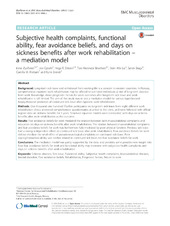Subjective health complaints, functional ability, fear avoidance beliefs, and days on sickness benefits after work rehabilitation – a mediation model
Øyeflaten, Irene Larsen; Opsahl, Jon; Eriksen, Hege Randi; Braathen, Tore Norendal; Lie, Stein Atle; Brage, Søren; Ihlebæk, Camilla; Breivik, Kyrre
Peer reviewed, Journal article
Published version

Åpne
Permanent lenke
https://hdl.handle.net/1956/12728Utgivelsesdato
2016-05-23Metadata
Vis full innførselSamlinger
Originalversjon
https://doi.org/10.1186/s12891-016-1084-xSammendrag
Background: Long-term sick leave and withdrawal from working life is a concern in western countries. In Norway, comprehensive inpatient work rehabilitation may be offered to sick listed individuals at risk of long-term absence from work. Knowledge about prognostic factors for work outcomes after long-term sick leave and work rehabilitation is still limited. The aim of this study was to test a mediation model for various hypothesized biopsychosocial predictors of continued sick leave after inpatient work rehabilitation. Methods: One thousand one hundred fifty-five participants on long-term sick leave from eight different work rehabilitation clinics answered comprehensive questionnaires at arrival to the clinic, and were followed with official register data on sickness benefits for 3 years. Structural equation models were conducted, with days on sickness benefits after work rehabilitation as the outcome. Results: Fear avoidance beliefs for work mediated the relation between both musculoskeletal complaints and education on days on sickness benefits after work rehabilitation. The relation between musculoskeletal complaints and fear avoidance beliefs for work was furthermore fully mediated by poor physical function. Previous sick leave had a strong independent effect on continued sick leave after work rehabilitation. Fear avoidance beliefs for work did not mediate the small effect of pseudoneurological complaints on continued sick leave. Poor coping/interaction ability was neither related to continued sick leave nor fear avoidance beliefs for work. Conclusions: The mediation model was partly supported by the data, and provides some possible new insight into how fear avoidance beliefs for work and functional ability may intervene with subjective health complaints and days on sickness benefits after work rehabilitation.
